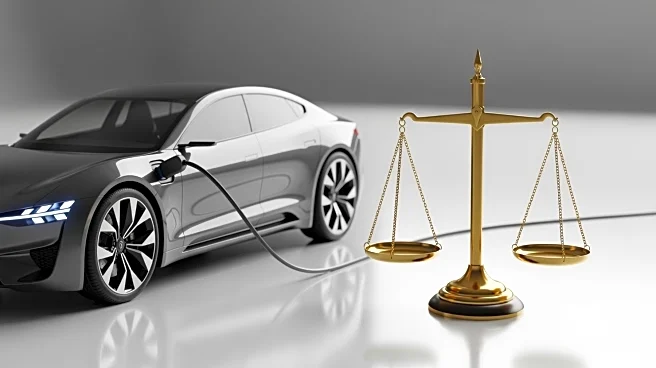What's Happening?
Tesla Inc. and its board of directors, including CEO Elon Musk, are appealing a decision by the Delaware Chancery Court that awarded $176 million in legal fees to shareholder attorneys. These attorneys challenged
the compensation paid to Tesla's board from 2017 to 2020. The case is now before the Delaware Supreme Court, where Tesla seeks to overturn the fee award. The original lawsuit targeted the pay of directors such as Oracle Corp. founder Larry Ellison, Musk's brother Kimbal, and a son of media mogul Rupert Murdoch. The settlement involved the board returning stock and options valued up to $735 million and forgoing three years of pay allegedly worth $184 million. The legal fees are intended for the firms that led the litigation: McCarter & English LLP, Fields Kupka & Shukurov LLP, and Bleichmar Fonti & Auld LLP.
Why It's Important?
The outcome of Tesla's appeal could have significant implications for corporate governance and shareholder rights. If the Delaware Supreme Court overturns the fee award, it may discourage future shareholder lawsuits challenging executive compensation, potentially affecting how corporate boards are held accountable. Conversely, upholding the award could empower shareholders and their attorneys to pursue similar cases, influencing how companies structure executive pay packages. The decision will also impact the financial strategies of Tesla and its board, as they navigate the legal and financial ramifications of the case.
What's Next?
The Delaware Supreme Court's decision will set a precedent for similar cases involving board compensation and shareholder litigation. Major stakeholders, including corporate boards and shareholder advocacy groups, will be closely monitoring the outcome. Depending on the ruling, Tesla may need to adjust its compensation practices or face further legal challenges. Additionally, the case could influence legislative or regulatory actions aimed at addressing executive pay and shareholder rights.
Beyond the Headlines
The case highlights broader ethical and legal questions about executive compensation and corporate accountability. It raises concerns about the balance of power between corporate boards and shareholders, and the role of the judiciary in resolving such disputes. The legal battle also underscores the complexities of corporate governance in high-profile companies like Tesla, where decisions can have far-reaching consequences for stakeholders and the industry.









